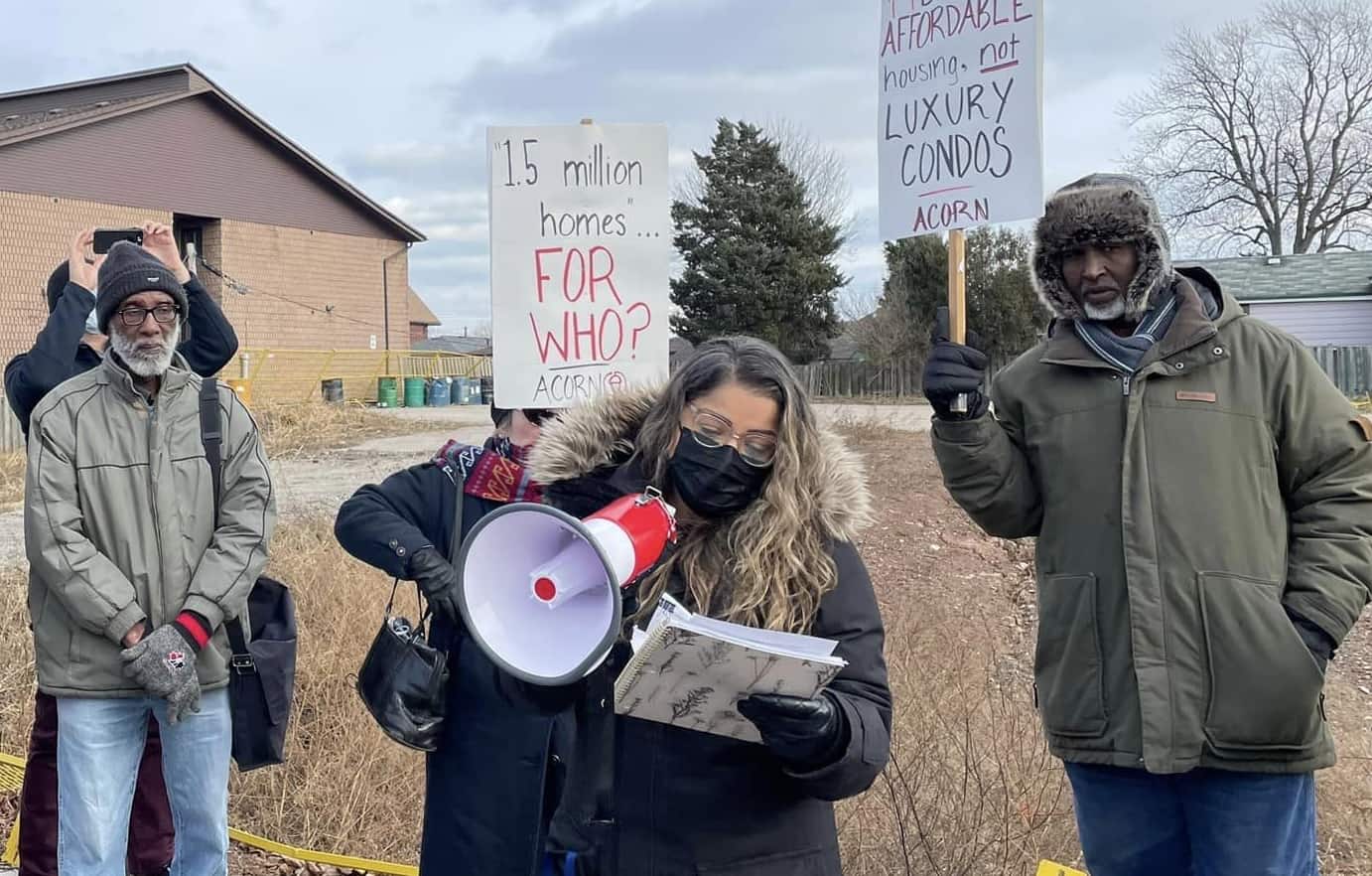Hamilton renters’ group continues to fight Bill 23 housing bill
Published December 20, 2022 at 5:14 pm

Standing where affordable housing stood within the last two years, renter advocates in Hamilton took part in a day of action against the province’s widely condemned housing bill.
Members of Hamilton ACORN, as well as Ward 3 Coun. Nrinder Nann and Hamilton Centre New Democrat candidate Sarah Jama, rallied in front of 468 James St. N. downtown on Tuesday. The rally was held synchronously with the release of a report by ACORN that contends that Hamilton will lose nearly 24,000 affordable housing units if Premier Doug Ford’s Bill 23, the More Homes Built Faster Act, is not revised and goes into law as written.
Bill 23, according to Ford and Municipal Affairs and Housing Minister Steve Clark, will encourage the construction of 1.5 million new homes in Ontario in order to solve a housing crisis. But it has been widely condemned from many corners of the province, including by Indigenous leaders, environmental groups, and municipal politicians.
The ACORN group is warning that a section of the bill that has yet to be implemented involves “standardizing rental replacement bylaws,” meaning cities such as Hamilton could not pass bylaws to address local need.
Nann told the crowd that the province was being wrongheaded by “focusing on supply instead of the social determinants of health,” noting that higher rents are forcing many people in Hamilton to skimp on necessities.
The latest national rent report shows that the average monthly rent for a one-bedroom apartment in Hamilton is $1,792 and the average for a two-bedroom is $2,127. Those figures, respectively, represent year-over-year increases of 21.3 per cent and 12.7%.
Affordable housing, or purpose-built rentals, tends to be in older buildings which are less energy-efficient.
But a lack of a rental replacement bylaw means that tenants whose home is torn down might not be able to afford the rent in the new building. During Ford’s first months in office in 2018, the PC Party of Ontario government eliminated rent controls on new builds to try to “bring in new supply (by opening) the market,” as then-finance minister Vic Fedeli put it at the time.
The last tenants at 468 James N. moved out in 2021. The space is slated to the be the site of HarbourLife, a “unique seven-storey retirement condominium.”
Last December, the City of Hamilton took steps to create an anti-renovictions bylaw regime, which would be modelled on one in New Westminster, B.C., that goes so far as to threaten landlords with the loss of their business licence. That could be off the table in a Bill 23 world.
By the numbers, ACORN projects that Hamilton stands to lose 23,895 purpose-built rentals if cities are barred from having rental replacement bylaws. Another 190,000-plus units would be lost in London, Mississauga, Ottawa and Toronto.
The ACORN report also cites a figure from the Federation of Rental Housing Providers in Ontario that says the province needs 300,000 new purpose-built rental homes in the next 10 years. But Ontario has been shedding about 20,000 per year.
Sixteen architectural and urban design firms also recently signed an open letter to Ford and Clark that explains why they “firmly believe that this legislation will not achieve its stated intent.”
In the letter, they say Bill 23 “will inhibit the construction of affordable housing in our province; dismantle regional planning and urban design considerations; undermine heritage protection, environmental protection, and climate change mitigation; and limit public participation in how we build our communities.”
It also notes that the number of units builders will be required to set aside for affordable housing will only be 5 per cent, and protections will expire after 25 years. The target percentage is 20 per cent, which is close to the same percentage of Hamilton households where the take-home income is under $60,000 annually.
Paying more than 30% on rent
Market principles aside, ACORN points out that census data shows that more than one in 10 households in Hamilton (11.6%) have an after-tax annual income of under $30,000. Nearly one in four (23.2%) have a take-home income under $60,000.
That would lead to paying 53 per cent of income for rent for a two-bedroom in a building constructed before 1990, and 71 per cent for a newer build (2005 or later). The Canadian Mortage and Housing Corporation says that no more than 30 per cent of a person’s monthly income should be spent on housing and utilities (heat, gas or water).
In its report, ACORN says it wants the province to “give more, not less, powers to cities so that they can enact and implement rental replacement bylaws and protect existing affordable housing. Destroying affordable homes in a bid to build more energy efficient homes is not the solution. Rather the solution is to boost investments and enable repairs in these existing affordable homes.”
It notes both Mississauga and Toronto have passed similar bylaws, and had some initial success in retaining and increasing affordable housing supply.
insauga's Editorial Standards and Policies advertising





